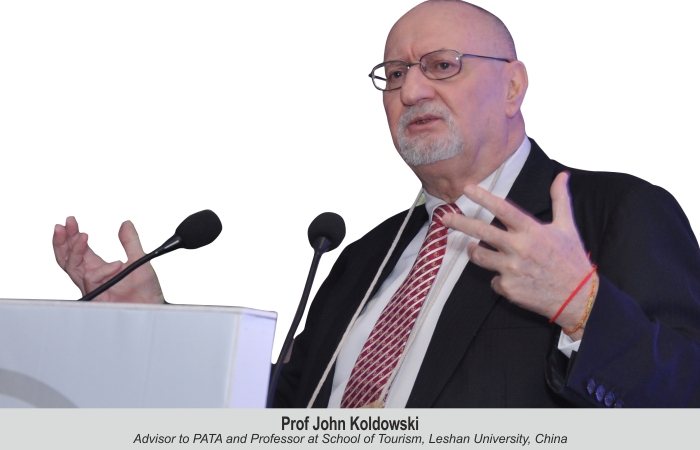Prof John Koldowski, Advisor to PATA and Professor at School of Tourism, Leshan University, China, and a renowned tourism analyst, shares an in-depth analysis on the forecast for Asia Pacific tourism, highlighting India as a market.
Hazel Jain
The recently held webinar titled ‘Asia Pacific Tourism Forecast’ conducted by PATA India Chapter aimed to analyse tourism forecasts based on the recent PATA report and research, with a perspective on both Asia Pacific as well as India markets. Chaired by Liz Ortiguera, CEO of PATA, the session had Prof John Koldowski, School of Tourism, Leshan University in China, share his perspective on how India can seize opportunities post COVID.
Separating ITA (International Tourist Arrivals) from IVA (International Visitor Arrivals), Prof Koldowski believes that there is a huge difference between day travellers and overnight visitors to a destination. “Both are equally important from a broader perspective. They both have some sort of impact on a destination – financial, social, etc. The data we have on this shows that the numbers appear to be tracking towards the better of the two scenarios. It may be negative for some time in relation to 2019 numbers, but tracking upwards nevertheless, which gives us some confidence that we are moving in the right direction,” he said.
However, he cautions, “I should add that that that direction can change at a moment’s notice. The volatility in the market place is still there and we have to be aware of some of the impacts. So by no means we are out of the woods, we’re still deep in the forest. But we are beginning to see that there are some positive gains. Overall, in Asia, there is still a lot of angst out there. Demand is pent up, it is raging. But it’s waiting on a wide range of things to actually get better.”
India a huge factor
Prof Koldowski added that when looking at India, the -76.15% fall in numbers in 2020 is different from the rest of Asia. “What it does show is just how South Asia as a destination sub-region is largely driven by what goes on in India. If India has a great year, then South Asia figures look fantastic and conversely, if India has a bad year, it reflects negatively in the South Asia figures.However, while inbound is one way, the outbound market from India is a little bit more robust and has shown some positive growth. There is a distinct change that India will be almost back to where it was in 2019,” he added.
Other factors
Highlighting some other factors that can affect the growth of tourism in the coming months, Prof Koldowski said, “For the first time, it is going to be the policies in the origins and the destination market that need to come into some sort of synchronicity. So we need to make sure that the governments are speaking with each other and agreeing on certain protocols as we begin to open up. There will also be a greater reliance on travel agents. But can we deliver the same sort of service levels as pre COVID? I would suggest that we need to produce better service levels than it was pre COVID. So there is a lot of change that we need to go through.”
He believes that government policies will dictate when the restrictions are lifted and we can get back to some sort of growth pathway. Towards the end of the session, he questioned why tourism industry relies on the dumbest data possible – the number of arrivals! “Just measuring the number of arrivals implies unity of one tourist to another – that one Australia is the same as one Italian or one Thai coming to India. We know that is not true. If we were measuring instead nights in destination, for instance, then we would have a better indicator of where future potential lies,” he says.
Other influencing factors
- Policies in both the origins and the destinations now feature large
- Vaccination rates not high enough across the globe
- Uncertainty about the reality of infection rates
- Risk of infection when travelling with families
- Insurance opportunities (might be mandated for some destinations)
- Stronger reliance on travel agents
- Business travel likely to lag – alternatives found and utilised
- Will immunisation passports become universal?
- Increasing unemployment rates and business failures
 TravTalk India Online Magazine
TravTalk India Online Magazine





